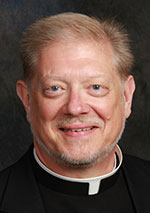That All May Be One / Fr. Rick Ginther
Ecumenical group offers witness to ‘reconciling power of Jesus’
 “Acronyms will be the death of me!” some complain. “Alphabet soup!” others grouse. Our world is awash in them, so it seems.
“Acronyms will be the death of me!” some complain. “Alphabet soup!” others grouse. Our world is awash in them, so it seems.
Acronyms are meant to be helpful shorthand. Marketing loves them and is quickly followed by the urge to shorten overly descriptive titles.
OEIA. That’s the acronym I invented to shorten the name of my office—Office of Ecumenism and Interreligious Affairs. It’s much easier to type those four letters than the 40-plus letters and spaces required.
CCT. I just recently had an opportunity to personally and professionally encounter this one—Christian Churches Together. Its focus is intriguing.
CCT is a relatively young ecumenical gathering of churches. According to the United States Conference of Catholic Bishops (USCCB) website (cutt.ly/USCCBCCT), the idea surfaced in conversations in September 2001 when “church leaders in the United States began to focus on the need for a ‘broader table’ ” or “forum that would bring together all the major denominations in the country, including evangelicals and Catholics.”
In March 2006, CCT was founded. The USCCB was one of the founding members. The website states that CCT “was envisioned as a place where Christian churches could form new relationships among themselves in order that ‘all who believe will be one with God and one another, so that the world may believe in Him as Lord and Savior.’ ”
Members are loosely organized in five “family groups”: Roman Catholic, Orthodox, Evangelical, Pentecostal, Historic Black and mainline Protestant communions and organizations. (For a complete listing, go to www.christianchurchestogether.org).
So many Christian denominations at one table—large and small—wanting to sit in dialogue around real-life issues.
One of the main goals of CCT is to increase the “religious literacy” of Christians in the U.S. The group holds to the concept of receptive ecumenism. Through it, they learn from each other about a variety of theologies, histories and organizations.
At each annual forum, experts gather with representatives from the family groups, and they bring a host of approaches to the topic or issue being discussed. These invited experts help with Bible study, theology and dialogue.
All participants are urged to live three charisms: loving relationships, learning theologically and leading actions. (The last is by choice, not consensus, for not all may be ready or comfortable with a proposed action.)
The most recent forum was in Indianapolis on Oct. 4-7. Participants focused on the question, “Who does Jesus call our Christian Churches to be in a polarized society?” Representatives from the five “families” of churches engaged in theological learning and spiritual reflection.
There was shared worship in local churches, including at SS. Peter and Paul Cathedral in Indianapolis with Archbishop Charles C. Thompson and at the Greater Gethsemane Baptist Church.
A prayer pilgrimage moved from Monument Circle in downtown Indianapolis to the historic Interchurch Center at Michigan Road and 42nd Street. Described as an “epicenter for ecumenical relations for the past century,” the Interchurch Center hosted representatives of the five “families,” who met with local denominational leaders for a brief meal, fellowship and welcome.
Punctuating the forum were keynote addresses from experts in the field of religion. Representatives from each of the communions addressed the question from their respective traditions and perspectives. Ecumenical dialogue in large and small group settings followed. It was a packed four days.
I know of no other ecumenical organization in the United States that is as broad-based as CCT. As its website states, they are “witnessing together to the reconciling power of Jesus.”
May such reconciliation be a watchword and focus of action in our polarized world.
(Father Rick Ginther is director of the archdiocesan Office of Ecumenism and Interreligious Affairs. He is also the pastor of Our Lady of Lourdes Parish in Indianapolis.) †
 “Acronyms will be the death of me!” some complain. “Alphabet soup!” others grouse. Our world is awash in them, so it seems.
“Acronyms will be the death of me!” some complain. “Alphabet soup!” others grouse. Our world is awash in them, so it seems.